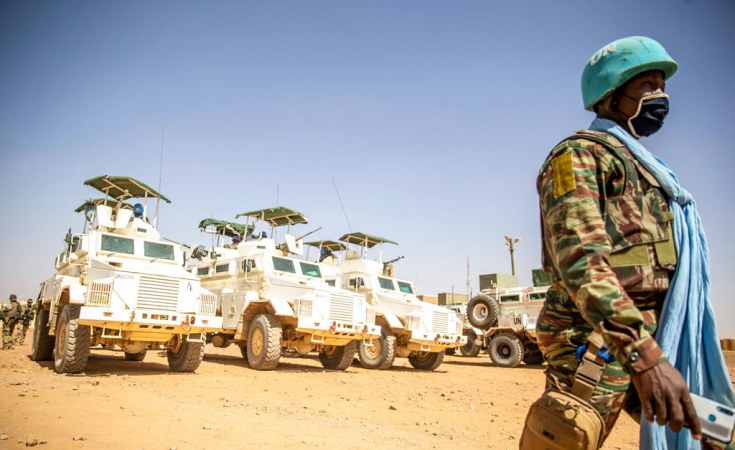Recent developments are positive for Africa but don't lessen the need for a robust AU Peace Fund.
The African Union (AU) and its regional economic communities have deployed about 27 peace support operations in Africa since the 2000s. These missions have faced various challenges, including the absence of a guiding political strategy, an over-reliance on military-heavy deployments and a lack of multidimensional capabilities and skills.
The shortage of adequate, sustainable and predictable funding has affected most of these deployments. To rectify the problem, the focus has increasingly been on using United Nations (UN) assessed contributions. These mandatory payments by member states using an agreed-to formula have become a key demand in a burgeoning UN-AU peace and security partnership.
On 1 May, UN Secretary-General António Guterres released a report on financing AU-led peace operations that could help address the longstanding demand for funding. It has set in motion vital policy processes that could see AU peace missions financed through UN funds, including a draft UN Security Council (UNSC) resolution to be negotiated later this year.
The AU Peace and Security Council (PSC) met on 12 May to discuss the report and how the AU Peace Fund could contribute. The three current African UNSC members (Gabon, Ghana and Mozambique) will brief the council on 25 May on models for financing peace operations.
Despite prior reluctance, some UNSC members seem inclined to favour UN support to AU missions
Guterres' report provides a valuable indicator of current thinking on the UN's approach to sustainable funding of peace missions. But implementing its recommendations hinges on the political will of key UNSC members, who must agree on the draft resolution and allocate the required resources.
In the past, the UN has financed some African peace support operations, such as the AU mission in Somalia, through assessed contributions. But these were exceptions, and the logistics support package in Somalia's case didn't cover all the mission's needs. The report says the realities of the current conflict and response landscape demand that predictable and sustainable financing to AU peace operations be 'considered in a more systematic manner.'
The Secretary-General's report broadly recognises the AU's progress on central aspects of the financing debate. These include financial burden sharing between the UN and AU, appropriate financing models, mandating and planning processes, and compliance with human rights and international humanitarian law. AU efforts to develop a strategic framework for compliance, accountability and discipline are also acknowledged.
The report proposed various financing modalities to be considered if the UNSC agrees to support AU-led peace missions on a case-by-case basis. The two preferred approaches in the Secretary-General's document align with the AU's position on using its Peace Fund.
The AU's burden-sharing proposal may not prove sufficient for some UNSC members
The first option is a hybrid UN-AU mission (like that deployed in Darfur) reporting to the UNSC and AU PSC, but managed by the UN under its regulations, rules, policies and procedures. The second is a UN support package (like that in Somalia) provided through assessed contributions. The support package could be used to implement UNSC-mandated activities, including those falling outside the scope of UN peace operations, as part of a coherent political strategy.
Guterres' report outlined a consultative process for joint planning, which reaffirms the UNSC's role in mandating AU missions that receive UN finances. Support requests would be channelled through the AU, followed by a joint assessment for UNSC and PSC consideration. Africa's regional economic communities could initiate requests for support through the AU and participate in joint AU-UN strategic assessments.
The report was silent on one key aspect: the AU's proposal to contribute 25% of the finances. This would largely cover mission planning, pre-deployment and preparation. The UN's 75% contribution would take care of the remaining deployment and post-deployment costs.
The report mentioned the AU's burden-sharing proposal without pronouncing on it. A new UNSC report says the arrangement may not prove sufficient for some UNSC members who insist the AU should show more commitment to funding peace operations. However, observers don't believe this will be a stumbling block in negotiations on the planned draft resolution.
The question of how to pay for African missions not authorised by the UNSC remains
Realising the report's aspirations hinges on the political will of leading UNSC members. Despite prior reluctance, some council members seem inclined to favour UN support to AU peace missions. This is mainly due to changing geopolitical dynamics and the challenges currently confronting larger UN peacekeeping operations.
The AU and its member states should seize this momentum to push for adopting a UNSC resolution on financing AU-led missions. Sustained diplomacy by the AU and the three African UNSC members will be vital. The AU is mooting the idea of appointing a Champion Leader to mobilise resources from development partners for AU peace and security activities. The champion could also advocate for adoption of the UNSC resolution.
While the Secretary-General's report is positive for Africa, it proposes financing only those AU operations mandated by the UNSC. The question of how to pay for African missions not authorised by the UNSC remains.
And even if implemented, the UN arrangement won't fully mitigate Africa's over-reliance on donor funds or advance African ownership of its peace efforts. Other avenues must be pursued, and the AU Peace Fund is an obvious option. Enhancing member states' commitment to the fund will require tough discussions within the continental body.
The funding debate should not detract from the need for comprehensive solutions to Africa's security challenges. Peace operations should be deployed only as part of a set of responses grounded in sound political strategy that provides for conflict prevention and inclusive governance.
Dawit Yohannes, Project Manager and Senior Researcher, Meressa K Dessu, Senior Researcher and Training Coordinator, and Emmaculate Asige Liaga, Researcher, ISS Addis Ababa


